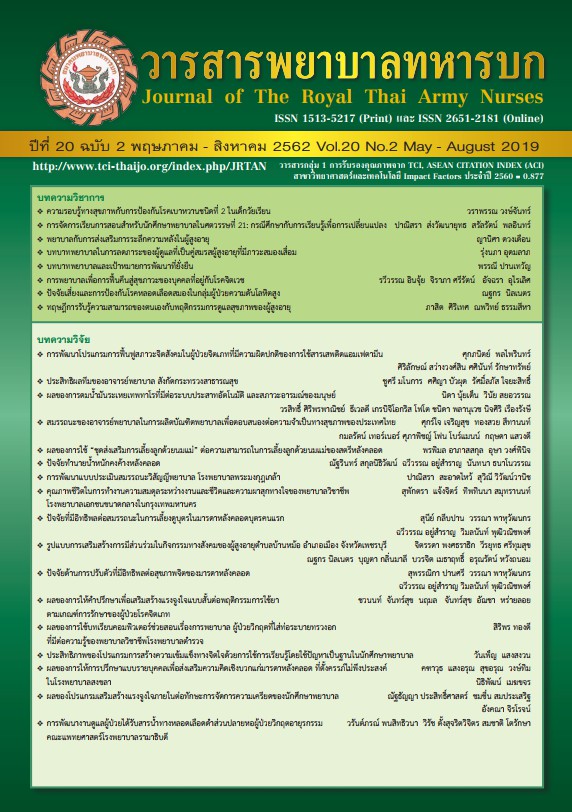Nurses and Promotion to Reminiscence in Older Adults
Keywords:
Nurses and promotion, Reminiscence, Older AdultsAbstract
When the age increase will changes in physical, mental, and health. Therefore, it is important that nurse have to prepare to care for the older adults in all dimension. In particular, the mental illness has increased when entering the older. Psychosocial therapy is an alternative care to help improve the mental health of the older adults and help to reduce the negative feelings. Psychosocial therapy is activity to care, related to older person in psychology and society. There are many types depending on the objectives and expected results. In this article talk about the reminiscence, that the one type of psychosocial therapy in the older adults. The nature of older adults will forget the new events that just happened, while able to remember the past story. Thinking about the past is one of the behaviors of the older adults. It’s consistent with the experience and appropriate for use in the older adults. This article aims to present about reminiscence, classification of reminiscence, mechanism of reminiscence, selection of form of reminiscence, Bringing the reminiscence to achieve the expected results, the role of nurses to step of reminiscence, nurses and promotions to reminiscence in older adults and case study.
Downloads
References
2. Mc Combe G, Fogarty F, Swan D, Hannigan A, Fealy GM, Kyne L, et al. Identified mental disorders in older adults in primary care: A cross-sectional database study. European Journal of General Practice 2018;24(1):84-91.
3. Foundation of Thai Gerontology Research and Development institute. Situation of the Thai elderly 2017. Bangkok: TQP; 2019.
4. Haseen F, Prasartkul P. Predictors of depression among older people living in rural areas of Thailand. Bangladesh Medical Research Council Bulletin 2011;37:51-6.
5. Wongpanarak N, Chaleoykitti S. Depression: A Significant Mental Health Problem of Elderly. Journal of The Royal Thai Army Nurses 2014; 15(3):24-31. (in Thai)
6. Ching-Teng Y, Chia-Ju L, Hsiu-Yueh L. Effects of structures group reminiscence therapy on the life satisfaction of institutionalized older adults in Taiwan. Social Work in Health Care 2018;57(8):674-87.
7. Huang HC, Chen YT, Chen PY, Huey-Lan Hu S, Liu F, Kuo YL, et al. Reminiscence Therapy Improves Cognitive Functions and Reduces Depression Symptoms in Elderly People With Dementia: A Meta-Analysis of Randomized Controlled Trials. Jamda 2015;16(12):1087-94.
8. Duangduen Y, Jitramontree N, Wirojratana V. The Effect of Group Reminiscence Program on Self-Esteem among Institutionalized Older Adults. Thai Journal of Nursing Council 2019;34(2):30-43.
9. Djukanovic I, Carlsson J, Peterson U. Group discussions with structured reminiscence and a problem-based method as an intervention to prevent depressive symptoms in older people. Journal of Clinical Nursing 2016;25(7):992-1000.
10. Burnside I, Schmidt MG. Working with older adults : group process and technique. 3rd ed. United State of America: Jones and Bartlett Publishers; 1994
11. Naleppa MJ, Kovacs PJ, Conlon A. Late Adulthood. In: Hutchison ED, editor. Essentials of human behavior: integrating person, environment, and the life course. 2nd ed. Los Angeles: SAGE Publications; 2017. p.507-43.
12. Afonso RM, Serrano-Selva JP, Latorre-Postigo JM. Reminiscence. In: Pachana NA, editor. Encyclopedia of Geropsychology. Singapore: Springer Science & Business Media Singapore; 2015. P.1-8.
13. Pinquart M,Forstmeier S. Effects of Reminiscence Intervention on Psychosocial Outcome: A Meta-Analysis. Aging and Mental Health 2012;16(5): 541-58.
14. Chiang KJ, Chu H, Chang HJ, Chung MH, Chen CH, Chiou HY, et al. The effects of reminiscence therapy on psychological well-being, depression, and loneliness among the institutionalized aged. International Journal of Geriatric Psychiatry 2010;25(4):380-8.
15. Afonso RM, Serrano-Selva JP, Latorre-Postigo JM. Reminiscence Interventions in Eldery People. In: Pachana NA, editor. Encyclopedia of Geropsychology. Singapore: Springer Science & Business Media Singapore; 2017
16. Park K, Lee S, Yang JE, Song T, Son Hong GR. A systematic review and meta-analysis on the effects of reminiscence therapy for people with dementia. International Psychogeriatric 2019:1-17.
17. Bazooband A, Baghbanian A, Torkfar G. A stusy of group reminiscence therapy and emotional intelligence among elderly members. Geriatric Care 2016;2(2):24-8.
18. Lotte H, Marjolein AV, Danielle V, Lindsay V, Bernadette MW. Life review therapy for older adults with depression symptoms in general practice: result of a pilot evaluation. International Psychogeriatric 2019:1-8.
19. Soonthornchaiya R. Psychosocial therapy for elderly. Bangkok: Thammasatpress; 2018. (in Thai)
20. Synder M. Reminiscence. In: Synder M, Lindquist R, editors. Complementary/Alternative therapies in nursing. 4thed. New York: Springer Publishing Company; 1998. p.143-51.
21. Wold GH. Basic geriatric nursing. 5thed. China: Mosby; 2012.
22. Trerin S, Naka K, Nukaew O. The effect of reminiscence program in self-esteem in hospitalized elders with chronic diseases. Songklanagarind Journal of Nursing 2017;37(2): 106-17.
23. Kapucu S, Asiret GD. To Use of Reminiscence Therapy on Alzheimer Patients. Journal of Neurology & Stroke 2017;6(2):198-9.
24. Yen HY, Lin LJ. A Systematic Review of Reminiscence Therapy for Older Adults in Taiwan. The Journal of Nursing Reseacher 2018;26(2):138-50.
25. Refahi Z, Ghaforiyan A. The Effect of the Group Reminiscence on the self esteem and life satisfaction Elders daily centers in Yazd. International Journal of Pharmaceutical Research & Allied Sciences 2016;5(3):535-46.
26. Touhy TA, Jett KF. Gerontological nursing health aging: Assessment tools in gerontological nursing. 3rd ed. United State of America: Mosby; 2014.
27. Sawangvoranard K., Cruthaka C. The Training Development Curriculum Cognitive Skills for The Elderly. Journal of The Royal Thai Army Nurses. 2019.20(1): 207-215.
Downloads
Published
How to Cite
Issue
Section
License
บทความหรือข้อคิดเห็นใดใดที่ปรากฏในวารสารพยาบาลทหารบกเป็นวรรณกรรมของผู้เขียน ซึ่งบรรณาธิการหรือสมาคมพยาบาลทหารบก ไม่จำเป็นต้องเห็นด้วย
บทความที่ได้รับการตีพิมพ์เป็นลิขสิทธิ์ของวารสารพยาบาลทหารบก
The ideas and opinions expressed in the Journal of The Royal Thai Army Nurses are those of the authors and not necessarily those
of the editor or Royal Thai Army Nurses Association.






